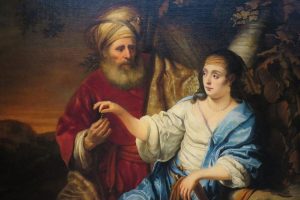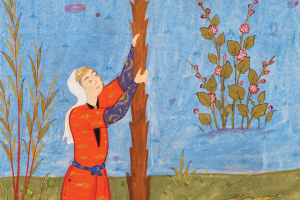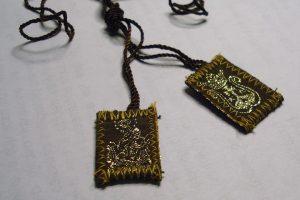Visiting seven churches in the late hours of Holy Thursday is sure to awaken the spirit.
The travels of faith depend on many means of transport. Elijah took off for heaven in a flaming chariot. The three wise men hit the road to Bethlehem on camels. Saint Brendan the Navigator crossed the sea in an ancient version of the Irish boat called a curragh. And in Chicago, after Mass on Holy Thursday night, Mike Cahill pilots me and our son James in our seen-better-days, 9-year-old car through the chilly streets to one Catholic church ofter another. Seven, if we can make that many before midnight, when they snuff out the candles and close the doors. Sometimes we take the Dan Ryan Expressway, regarded by more timid Chicagoans as the road most likely to speed you, too, on your journey to heaven, minus the flaming chariot. Flaming autos, more likely.
Our drive tonight feels like riding in a funeral: We don't play the radio. We don't listen to the Cubs game–though some claim that enduring a Cubs game is in itself a penitential rite. We might sing a song or two. Mostly we talk.
Holy Thursday is a night rich in symbol. After the Mass, with its blessing of oils and washing of feet, its jubilant songs, the altar is left bare. The priest carries the Blessed Sacrament in procession to an "altar of repose," which blazes with candles and bursts with flowers. People gather there to pray, until midnight if the church stays open that long. In the quiet, thoughts barge in of what followed the Last Supper: the garden, the sleeping disciples, the prayer of anguish, and then the soldiers.
Years back a friend told us of the custom of visiting churches on this night. Although written sources remain elusive, apparently the tradition came from Rome, where pilgrims walked to visit the seven major basilicas on holy days, says David Philippart of Liturgy Training Publications. Brought to America, it became a neighborhood custom. Decades ago, ethnic parishes vied to see which could build the most elaborate, beautiful altar of repose. Naturally everyone wanted to check out the competition and get some ideas for next year.
We are lucky to live in Chicago, where you can hardly throw a stone and not hit a Catholic church. Along with visiting a few of the city's famous old church buildings on this night, my husband seeks out places off the beaten track, whose steeples we have only seen while whizzing by on the expressway. One of us will hop out and try the door. If it's open, we go in, we kneel down, we pray for a while.
We walk quietly around, admiring the ornately painted ceilings, the statues, the Stations of the Cross. In not one church can you miss the fact that Holy Week is upon us.
At St. Sabina's, a purple banner hangs the whole width of the balcony. It inquires in giant letters, "Discipleship costs. Are you willing?"
The night invites us to wrestle with this question. Oh, sure, I could reflect on it at home, but I know I wouldn't. The dark churches help us stay mindful of who we are: beloved children of God, but also quite capable of protesting, as Peter did on this very night, "I don't even know the man!" Discipleship costs, and he wasn't willing to pay the price–not yet, anyway. What about me?
At St. Mary of the Angels, alive with people, we see a family making their way on their knees up the aisle toward the Blessed Sacrament. The smiling kids appear to be enjoying this challenge. At St. Pius V, close to midnight, five or six people come in and sit down, one man with a guitar. He plays, and they begin to sing songs in Spanish. At St. Francis of Assisi, saved from the wrecking ball by the skin of its teeth, a chartered bus pulls up and lets out a bunch of older folks from a parish far from here. They all admire the beautiful restoration of the interior. I wish, though, that they would be more quiet.
At some churches, the only person around is the pastor, usually stationed in the back pew to keep an eye on things. He might turn his head briefly to check us out; maybe offer a smile or a nod. Or, he might give us our privacy on this night that can stir up grief or guilt or the memory of the dark times we've nodded off–like the friends of that man in the Garden of Gethsemane–when God needed us just to stay awake.
This article appeared in the March 2001 issue of U.S. Catholic (Vol. 66 No. 3 page 49).












Add comment